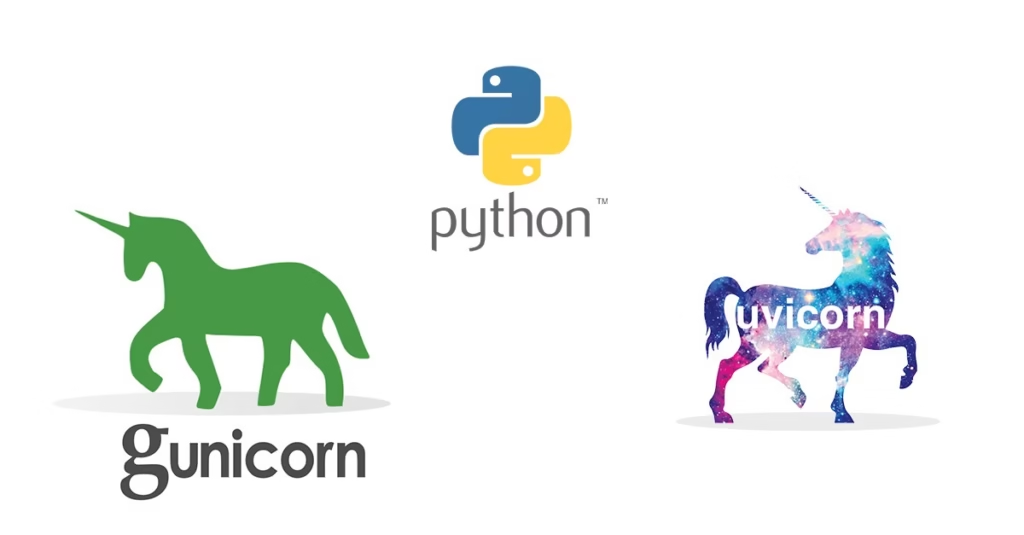A web server is a software that handles incoming requests from clients (usually browsers) and serves responses, such as web pages, data, or files. Python web servers can handle various protocols and are often used for serving websites, APIs, and static content.
Table of Contents
Standards for Python Web Applications to communicate with web servers
Standards for Python web applications are formalized specifications that define how web servers and Python web frameworks should interact to process HTTP requests and return responses. These standards ensure interoperability between different components, making it easier to build, deploy, and maintain web applications. The most commonly used standards for Python web applications are:
- WSGI (Web Server Gateway Interface): WSGI is a specification or standard for Python web applications to communicate with web servers. WSGI is the most widely adopted standard for synchronous Python web applications. It enables a web server (like Gunicorn or uWSGI) to serve any Python web framework (like Flask or Django) without requiring custom integration.
- ASGI (Asynchronous Server Gateway Interface): ASGI is the standard for asynchronous web frameworks and servers. It is designed for modern web applications that need to handle WebSockets, HTTP/2, or other long-lived connections.
Gunicorn
- Gunicorn (Green Unicorn) follows the WSGI standard. it is widely used in the Python web development ecosystem.
- It is a pre-fork worker model, meaning it forks multiple worker processes to handle concurrent requests. This allows it to scale well in environments where requests are processed synchronously.
- Gunicorn is known for being lightweight and fast, with support for multiple worker types (sync, async, etc.), and it works with any Python web framework that supports WSGI, such as Flask, Django, and Pyramid.
Uvicorn
- Uvicorn is an ASGI server built for high-performance asynchronous web applications.
- It is lightweight, fast, and built on top of uvloop and httptools, which are designed for performance.
- Uvicorn can handle both HTTP and WebSocket connections, making it an excellent choice for modern web frameworks that support ASGI, such as FastAPI and Starlette.
Unlike WSGI servers like Gunicorn, which are designed for synchronous requests, Uvicorn is built to handle asynchronous code using the async/await syntax.

Key Differences:
- Concurrency: Gunicorn handles concurrency by spawning multiple worker processes, while Uvicorn leverages Python’s async/await to handle concurrency more efficiently.
- WSGI vs. ASGI: Gunicorn is used for WSGI applications (synchronous), while Uvicorn is used for ASGI applications (asynchronous).
- Use Case: If you’re building an asynchronous web app, especially with frameworks like FastAPI, Uvicorn is the better choice. For synchronous apps, Gunicorn is widely used.
Choosing Between Gunicorn and Uvicorn
When deciding between Gunicorn and Uvicorn, it comes down to the type of application you’re building:
- If you’re working with a synchronous web framework like Flask or Django, Gunicorn is the right choice. It works seamlessly with these frameworks, ensuring efficient handling of HTTP requests.
- If you’re building a modern asynchronous application using FastAPI, Starlette, or any other ASGI framework, Uvicorn is the optimal choice. It provides superior performance for asynchronous tasks, WebSockets, and long-lived connections.
Combining Gunicorn and Uvicorn
For some applications, you might even combine Gunicorn and Uvicorn to take advantage of both. For example, when deploying a FastAPI app, you can run Uvicorn workers under Gunicorn to manage multiple processes and ensure efficient handling of both synchronous and asynchronous requests.
Common Python Webservers
| Web Server | Type | Use Case | Key Features | Production-Ready | Supports Async | WebSocket Support |
|---|---|---|---|---|---|---|
| Gunicorn | WSGI | General-purpose production deployments | Multi-threading, multiple workers, easy setup | Yes | No | No |
| Uvicorn | ASGI | FastAPI, Starlette, and async apps | High-performance, HTTP/1, HTTP/2, WebSockets | Yes | Yes | Yes |
| Waitress | WSGI | Lightweight, simple web apps | Easy configuration, robust error handling | Yes | No | No |
| Flask Built-in | Development Server | Development and testing only | Quick setup, simple to use | No | No | No |
| Tornado | Framework + Server | Real-time, long-lived connections | Non-blocking I/O, WebSocket support, scalable | Yes | Yes | Yes |
| Hypercorn | ASGI | Async frameworks like FastAPI, Starlette | HTTP/1, HTTP/2, WebSocket support, async-ready | Yes | Yes | Yes |
| Daphne | ASGI | Async apps, Django Channels | HTTP/2, WebSocket, lightweight for async | Yes | Yes | Yes |
| uWSGI | WSGI | High-performance production applications | Protocol versatility, clustering, process management | Yes | No | No |
Conclusion
Gunicorn and Uvicorn are Python web servers designed for different types of applications. Gunicorn is used for synchronous WSGI applications, while Uvicorn is designed to handle asynchronous ASGI applications. The choice between Gunicorn and Uvicorn depends on whether your application is synchronous or asynchronous, and which framework you’re using. Both servers play crucial roles in Python web development and can be combined for greater performance and scalability.

2 thoughts on “Popular Python Web Server”